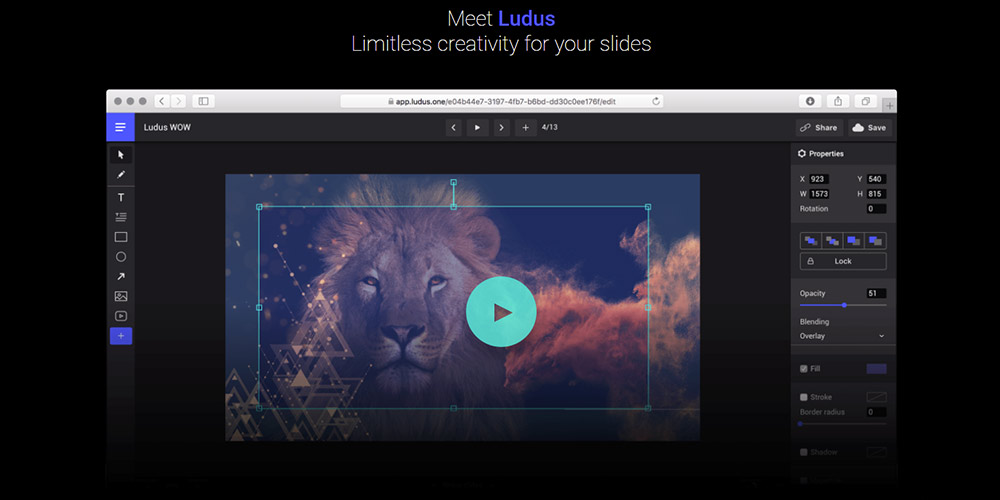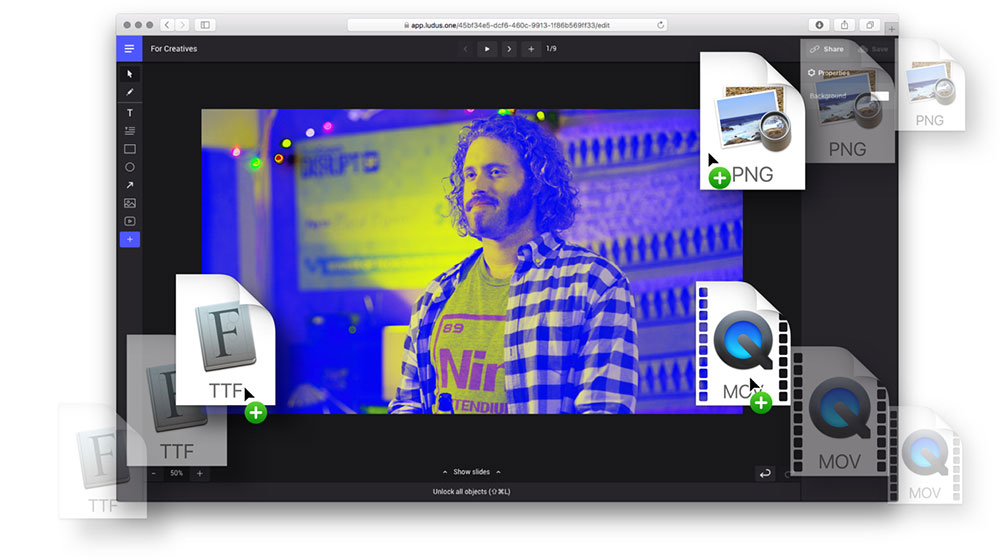* – This article has been archived and is no longer updated by our editorial team –
Ludus combines the advanced features every designer needs (like keyboard shortcuts, blend modes or color overlay) with the benefits of a web-based application (so it’s easy to share and to collaborate). You can also drag & drop (virtually) anything into your slides: custom fonts, pictures, videos, etc. but more importantly, they also integrate with various external services like YouTube, Vimeo, GIPHY, Figma, Sketchfab, Unsplash, Typeform, InVision, Framer, CodePen, and many more. They now have 21 integrations in total and keep on adding new ones on a regular basis.
Below is our interview with Dorian Van Bever, Co-Founder and Chief Marketing Officer at Ludus:

Q: You’ve recently announced $550K Seed funding round; could you tell us something more?
A: We launched our private beta on Product Hunt in May of this year and received a lot of solicitations from angel investors and VCs afterwards, thanks to the awesome traction we got (20K+ sign ups in total and now 4K Monthly Active Users) but more importantly because we proved we are solving a real problem for a particular niche. We are very happy and proud to have investors who are aligned with our vision and who can help us achieve the next milestones thanks to their impressive track record and their network. They include Kima Ventures, 122 WEST VENTURES, LeanSquare, Jeremy Le Van (Microsoft, ex-Sunrise, ex-Foursquare), Guillaume Golsong (ex-Apple), and a few others from Belgium, France and the USA.
 Recommended: in/PACT Announces The Launch Of GoodCoin Charitable Donation Platform For Banks And Financial Institutions
Recommended: in/PACT Announces The Launch Of GoodCoin Charitable Donation Platform For Banks And Financial Institutions
Q: What is the story behind Ludus, how did you start?
A: Our CEO (Lionel), who was working in his own web agency at the time, was frustrated by all the presentation tools he used and decided he wanted to build a better one. He started to talk about it to Vincent then to Jennifer and Dorian and we all agreed that there was something to do. So, we incorporated a company in Delaware (thanks to Stripe Atlas) and started working on an MVP (Vincent did it almost alone, starting in January 2017). The goal was to build something real quick to see if we could generate some interest for a product like this. After the awesome results from Product Hunt, the three other founders switched full-time, and since then, we hired two more engineers to complete the team (more about it here).
Q: Can you give us insights into your features?
A: Our true killer feature is what we call the Smart Blocks. We believe this is something that could ultimately send good old templates to an early retirement, because it’s more flexible and more granular than templates. If you update your block at one place, it gets populated everywhere. It works almost exactly the same way as the Symbols in Sketch. They also enable a new kind of collaboration when it comes to presentation design because anyone in a team could use the Smart Blocks that have been created by teammates. That allows everyone (even the less-creative people) to create good-looking and consistent presentations.
 Recommended: OZMOSI Launches Two New Intelligence Tools To Help Its Clients Make Better Business Critical Decisions
Recommended: OZMOSI Launches Two New Intelligence Tools To Help Its Clients Make Better Business Critical Decisions
Q: How would you convince the reader to start using Ludus?
A: One of the promises of Ludus is that it’s a limitless tool. We want to provide a blank sheet and let people to express their creativity. We don’t want to be creative for people. It’s like the difference between a box of LEGO blocks and a Barbie doll. With a Barbie doll, you can just play Barbie. With LEGO blocks, you can create whatever you want. We also promise speed with Ludus. We know that PowerPoint is forbidden in some companies because it’s too time-consuming. We want people to be efficient again when they create content, by providing the best UX that has ever been made in a presentation tool. But the most important promise is that we want people to have fun again while building presentations. That’s why we chose the name “Ludus” In Latin, one of its significations is “playing”. That’s something we want to achieve with Ludus: let people actually forget that they are working.
Q: What are your plans for the future?
A: Right now, we are really focused on providing the best tool for people working in the creative fields (mainly freelance designers and agencies) but our ambition is to broaden our target more and more, and ultimately become the presentation tool of choice for anyone. In the near future, we’ll push the collaboration features further while still improving the general UX and adding integrations in parallel. In the long run, we we want to become a new standard for knowledge sharing and possibly become a platform that revolutionizes the way we teach and learn. That doesn’t sound utopian to us because we already see a lot of interest from the education sector.
Last Updated on January 20, 2018

